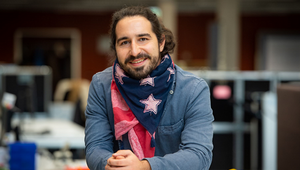QuanTour: A European Initiative at the JKU to Showcase Quantum Physics
Quantum physics is as mysterious as it sounds, with everything from "spooky action at a distance" to "Schrödinger's cat", which is both dead and alive.

Quantum physics is vital to modern technology. In an effort to draw attention to this fascinating field of research, the Johannes Kepler University Linz is now taking part in the QuanTour project, which involves conducting quantum physics experiments in twelve European cities.
Quantum misconceptions are widespread and even researchers around the world agree that we still have a long way to go before we fully understand quantum physics. We are already using it, however, and on a daily basis. Quantum physics lies at the heart of each supermarket checkout, in GPS systems, and numerous other everyday devices.
A European-wide Initiative
The "QuanTour - A Quantum Emitter Goes on Tour" features a customized quantum light source traveling across Europe aimed at dispelling any fears and inhibitions about quantum physics and sparking a sense of curiosity. In the space of a year, the quantum light source will visit twelve laboratories in just as many different European cities. QuanTour is an outreach initiative designed to kick off the "2025 International Year of Quantum Physics and Technology". The light source will be in Austria between April 14 and May 3, namely at the JKU's Institute of Semiconductor and Solid-State Physics (dept head: Prof. Armando Rastelli).
Applied Quantum Physics at the JKU
For over 20 years, Armando Rastelli's research group has been conducting research on semiconductor-based sources of single photons and entangled photon pairs. Each of these sources, so-called "quantum dots", behave in many respects like an individual atom. However, unlike atoms, quantum dots can be integrated into technical devices.
Prof. Rastelli explained: "The QuantTour program is an outstanding way to demonstrate this property. The TU Berlin will give us a quantum dot device to operate as a photon source at our laboratories, measure it, and then it will tour Europe."
Although it may sound abstract, its significance is quite tangible. The JKU physicist added: "Quantum dots could become the cornerstone behind secure data transmission by means of entangled photons, meaning light. We are not only talking about tap-proof quantum communications, they could also one day facilitate reliable quantum computers."
A Nanometer Size “Cage”
Researchers at the JKU are currently conducting a Hanbury Brown-Twiss experiment that involves determining whether or not a light source emits more than just one light particle (photon) at a time. What seems like it should be obvious is not always the case as when it comes to conventional LEDs, for example, you get "clumps of light".
The experiment includes building a quantum dot, like a tiny little "cage", for electrons in the nanometer scale (a nanometer is one billionth of a meter, approximately the length of four atoms). The effect occurs because this quantum dot is so small. "The electrons are forced to emit light particles of a very specific energy," explained Rastelli's colleague, Maximilian Aigner. Detectors are then used to observe only one emitted light particle at a time.
Demonstrations during the Long Night of Research
While quantum physicists routinely conduct these types of experiment, non-experts find the topic enigmatic yet extremely fascinating.
Anyone interested in exploring the world of quantum physics for themselves can do so on May 24 during the Long Night of Research at the JKU’s Institute of Semiconductor and Solid-State Physics. Visitors can learn more about photon sources similar to those created at the JKU.
News

 Go to JKU Homepage
Go to JKU Homepage











